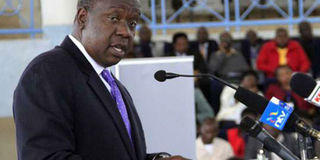Eight colleges set to receive charters

Education Cabinet Secretary Fred Matiang'i addresses students at Kenyatta University on August 22, 2016. President Uhuru Kenyatta will award charters to eight universities at State House, Nairobi, on October 7. PHOTO | DIANA NGILA | NATION MEDIA GROUP
What you need to know:
- The award of the charters has been on the card since early this year but it has been postponed on several occasions.
- More than 12,000 government sponsored students have been placed in private universities while 74,000 students have joined public universities.
Eight colleges are set to become fully-fledged universities.
President Uhuru Kenyatta will award charters to the universities at State House, Nairobi, on October 7.
The university colleges that will receive the charters are Kirinyaga, Machakos, Rongo, Co-operative, Taita Taveta, Murang’a, Embu University and Kenya Assemblies of God East Africa School of Theology (a private college).
The award of the charters has been on the card since early this year but it has been postponed on several occasions.
Statistics from the Commission for University Education indicate that there are 23 accredited public universities, 12 public universities constituent colleges, 17 chartered private universities, five private university constituent colleges and 14 private universities with Letters of Interim Authority.
There are more than 500,000 students pursuing education in these institutions.
The expansion of the universities will increase admissions as only a third of students who sit for Kenya Certificate of Secondary Education examination join universities due to a shortage of places.
More than 12,000 government sponsored students have been placed in private universities while 74,000 students have joined public universities.
Education Cabinet Secretary Fred Matiang’i said no government anywhere in the world can afford all the resources to educate its population.
“It is time to debate the role of private enterprise and explore ways in which the government can facilitate higher education,” said Dr Matiang’i recently.
At the same time, public and private universities in the country have been challenged to put in place structures and systems that will attract, sustain and support international students.





